List of Egyptian flags
This is a list of flags used by and in Egypt. For more information about the national flag, visit the article Flag of Egypt.
| Wikimedia Commons has media related to Flags of Egypt. |
National flags
| Flag | Date | Use | Description |
|---|---|---|---|
 |
1984 – present | Current national flag (adopted by Law No. 144 of 1984) |
Tricolour made of three equal horizontal bands—coloured red (top), white (middle) and black (bottom)—with the golden Eagle of Saladin centered in the white band.[1] |
.svg.png) |
1972 – 1984 | Flag of Egypt as part of the Federation of Arab Republics (adopted by Law No. 3 of 1971) |
Tricolour made of three equal horizontal bands—coloured red (top), white (middle) and black (bottom)—with the golden Hawk of Quraysh centered in the white band.[1] |
 |
1958 – 1972 | Flag of Egypt as part of the United Arab Republic (adopted by Law by Resolution No. 12 of 1958) |
Tricolour made of three equal horizontal bands—coloured red (top), white (middle) and black (bottom)—with two five-pointed green stars in the white band, symbolizing Egypt and Syria.[2] |
.svg.png) |
1952 – 1958 | Egyptian Revolution Flag Alternate flag of the Republic of Egypt |
Following the Revolution of 1952, the Free Officers retained the flag of the Kingdom, but also introduced the Arab Liberation flag of red, white, and black horizontal bands, with the emblem of the Revolution, the Eagle of Saladin, in the center band, with a green escutcheon with a white crescent and five stars. |
.svg.png) |
1923 – 1958 | Flag of the Kingdom of Egypt and the Republic of Egypt (adopted by Law No. 47 of 1923) |
Green flag with a white crescent containing three five-pointed white stars.[3] |
Standards
Presidential standards
Throughout the republican era, the Standard of the President of Egypt has been identical to the national flag, with the addition of the coat of arms (eagle or hawk) in the upper-left corner.[1] Even though the Constitution of Egypt states that the President is the Supreme Commander of the Armed Forces (article 150), the flag of the Supreme Commander differs from the Presidential Standard. It is identical to the national flag, with the addition in the upper-left corner of a white Eagle of Saladin contained between two crossed swords. The Supreme Commander also has his own naval ensign, air force flag and air defence flag. Military ordinances state that the flags of the Supreme Commander must be hoisted during the President's visits to each military unit. The national flag must be hoisted in the middle, with the Presidential Standard on its right side, and the flag of the Supreme Commander on its left side.[4]
| Flag | Date | Use | Description |
|---|---|---|---|
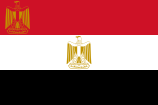 |
1984 – present | Current Presidential Standard | Identical to the current national flag—tricolour featuring the golden Eagle of Saladin—with a second Eagle of Saladin added in the upper-left corner of the red band.[4] |
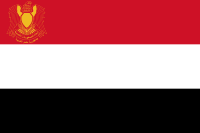 |
1972 – 1984 | Federation of Arab Republics Presidential Standard | Identical to Federation of Arab Republics' flag—tricolour featuring the golden Eagle of Quraish on the upper-left corner of red band.[4] |
.svg.png) |
1958 – 1972 | Standard of President of Egypt at sea |
Royal standards
| Flag | Date | Use | Description |
|---|---|---|---|
.svg.png) |
1923 – 1953 | Standard of the King of Egypt (adopted by Royal Ordinance No. 90 of 1923) |
Identical to the national flag of the Kingdom of Egypt, with the royal crown added in the upper-left corner. |
 |
? – 1953 | Naval Ensign of the King of Egypt | |
 |
1946 – 1953 | Flag of the King's Air Force (adopted by Royal Decree No. 40 of 1946) |
|
.svg.png) |
1946 – 1953 | Flag of the King's Airplane (adopted by Royal Decree No. 40 of 1946) |
|
.svg.png) |
1946 – 1953 | Standard of the Crown Prince (adopted by Royal Decree No. 28 of 1946) |
|
 |
1946 – 1953 | Naval Ensign of the Crown Prince (adopted by Royal Decree No. 28 of 1946) |
|
 |
1946 – 1953 | Flag of the Crown Prince's Air Force and Airplane (adopted by Royal Decree No. 28 of 1946) |
Military flags
| Flag | Date | Use | Description |
|---|---|---|---|
.svg.png) |
1922 – 1958 | War flag of Egypt | The flag of Egypt from 1922 to 1958 with two crossed swords in white in the canton[5] |
.svg.png) |
1922 – 1958 | Naval ensign and jack of Egypt | The flag of Egypt from 1922 to 1958 with two crossed anchors in white in the canton[5] |
.svg.png) |
1922 – 1958 | Air force ensign of Egypt | The flag of Egypt from 1922 to 1958 in the canton on a sky blue field with the roundel at the fly[6] |
 |
1958 – 1972 | War flag of the United Arab Republic | The flag of the United Arab Republic with two crossed swords in white in the canton[5][7] |
 |
1958 – 1972 | Naval ensign and jack of the United Arab Republic | The flag of the United Arab Republic with two crossed anchors in white in the canton[5][7] |
 |
1958 – 1972 | Air force ensign of the United Arab Republic | The flag of the United Arab Republic in the canton on a sky blue field with the roundel at the fly[7] |
.svg.png) |
1972 – 1984 | War flag of Egypt | The flag of Egypt within the Federation of Arab Republics with two crossed swords in white in the canton[5] |
 |
1972 – 1984 | Naval ensign and jack of Egypt | The flag of Egypt within the Federation of Arab Republics with two crossed anchors in white in the canton[5] |
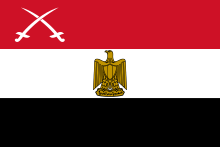 |
1984 – Current | War flag of Egypt | The flag of Egypt with two crossed swords in white in the canton[5][8] |
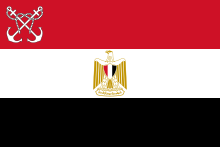 |
1984 – Current | Naval ensign and jack of Egypt | The flag of Egypt with two crossed anchors in white in the canton[5][8] |
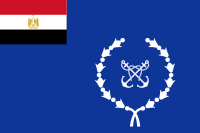 |
1984 – Current | Flag of the Egyptian Navy | The flag of Egypt in the canton on a blue field with the two crossed white anchor surrounded by a wreath at the fly[8] |
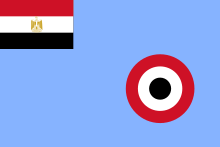 |
1984 – Current | Air force ensign of Egypt | The flag of Egypt in the canton on a sky blue field with the roundel at the fly[8] |
| 1984 – Current | Masthead pennant of the Egyptian Navy | ||
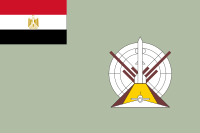 |
1984 – Current | Flag of the Egyptian Air Defense Forces |
Air Force rank flags
| Flag | Date | Use | Description |
|---|---|---|---|
 |
1932 – 1958 | Air Force rank flag of the Commander in Chief | |
 |
1932 – 1958 | Air Force rank flag of Wing Commander | |
 |
1932 – 1958 | Air Force rank flag of senior flight officer | |
Navy rank flags
| Flag | Date | Use | Description |
|---|---|---|---|
.svg.png) |
1922 – 1958 | Flag of admiral | |
.svg.png) |
1922 – 1958 | Flag of vice admiral | |
.svg.png) |
1922 – 1958 | Flag of senior officer | |
 |
1984 – Current | Flag of vice admiral | |
 |
1984 – Current | Flag of rear admiral | |
 |
1984 – Current | Flag of senior officer |
Army rank flags
| Flag | Date | Use | Description |
|---|---|---|---|
.svg.png) |
1922 – 1958 | Flag of major general | |
.svg.png) |
1922 – 1958 | Flag of lieutenant general |
Flags of governorates
Unofficial flags
| Flag | Date | Use | Description |
|---|---|---|---|
.svg.png) |
1952 – 1958 | Arab Liberation Flag used after the Revolution of 1952 The green monarchical flag (see above) remained the national flag of Egypt until 1958, even after the proclamation of the Republic. The Arab Liberation Flag never attained official status, although it was hoisted alongside the green flag during popular, national occasions.[2] |
Tricolour made of three equal horizontal bands—coloured red (top), white (middle) and black (bottom)—with the republican eagle bearing the green field, and white crescent and stars of the flag of the Kingdom of Egypt and Sudan centred in the white band. |
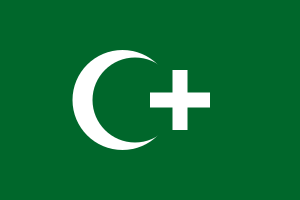 |
1919 | Flag used during the anti-British Revolution of 1919 | Green flag with a white crescent and a white cross symbolizing the common struggle of Egyptian Muslims and Egyptian Christians against the British occupation.[3] Associated with the Wafd Party. |
 |
1950s | Proposed flag for the Republic of Egypt following the Egyptian Revolution of 1952 | Egypt became a republic in 1953, the year after King Farouk was toppled in the revolution, and several proposals for a new national flag were made combining elements of the old flag of the kingdom with the Arab Liberation Flag. This design features the entire flag of the Kingdom of Egypt in the canton of the Arab Liberation tricolour (i.e. the Arab Liberation Flag without the Eagle of Saladin). |
 |
1950s | Proposed flag for the Republic of Egypt following the Egyptian Revolution of 1952 | Egypt became a republic in 1953, the year after King Farouk was toppled in the revolution, and several proposals for a new national flag were made combining elements of the old flag of the kingdom with the Arab Liberation Flag. This design features the Arab Liberation tricolour in the canton of the flag of the Kingdom of Egypt, the latter modified with the white crescent and stars re-positioned to the right to accommodate the tricolour in the canton. |
 |
1950s | Proposed flag for the Republic of Egypt following the Egyptian Revolution of 1952 | Egypt became a republic in 1953, the year after King Farouk was toppled in the revolution, and several proposals for a new national flag were made combining elements of the old flag of the kingdom with the Arab Liberation Flag. This design features the flag of the Kingdom of Egypt - white crescent and stars on a green field - inverted horizontally on the left, and the Arab Liberation tricolour as an elongated chevron on the right. |
 |
1950s | Proposed flag for the Republic of Egypt following the Egyptian Revolution of 1952 | Egypt became a republic in 1953, the year after King Farouk was toppled in the revolution, and several proposals for a new national flag were made combining elements of the old flag of the kingdom with the Arab Liberation Flag. This design features the Arab Liberation tricolour, with the flag of the Kingdom of Egypt inverted horizontally as a chevron on the right. |
 |
1950s | Proposed flag for the Republic of Egypt following the Egyptian Revolution of 1952 | Egypt became a republic in 1953, the year after King Farouk was toppled in the revolution, and several proposals for a new national flag were made combining elements of the old flag of the kingdom with the Arab Liberation Flag. This design features the white crescent and stars on a green field of the flag of the Kingdom of Egypt rotated 90° crowned by a white representation of the three Pyramids of Giza all appearing on the left, and the Arab Liberation tricolour on the right. |
 |
1919 | Proposed flag for the Republic of Egypt following the Egyptian Revolution of 1952 | Egypt became a republic in 1953, the year after King Farouk was toppled in the revolution, and several proposals for a new national flag were made combining elements of the old flag of the kingdom with the Arab Liberation Flag. This design features a white representation of the River Nile on the green field of the flag of the Kingdom of Egypt, with the Arab Liberation tricolour in a right-hand side canton onto which the crescent and three stars of the flag of the Kingdom of Egypt are placed and rendered in gold. |
Historical flags
| Flag | Date | Use | Description |
|---|---|---|---|
.svg.png) |
1914 – 1923 | Flag of the Sultanate of Egypt | Identical to the national flag used between 1867 and 1881 (see description below).[3] |
.svg.png) |
1881 – 1914 | Flag of the Khedivate of Egypt under British occupation | Identical to the national flag used between 1826 and 1867 (see description below).[3] |
.svg.png) |
1867 – 1881 | Flag of the Khedivate of Egypt | Red flag with three white crescents, each containing a five-pointed white star.[3] |
.svg.png) |
1844 – 1867 | Flag of self-declared Khedivate of Egypt introduced by Muhammad Ali | Red flag with a white crescent containing a five-pointed white star.[3] |
.svg.png) |
1793 - 1844 | Flag of Ottoman Egypt | Red flag with a white crescent containing a seven-pointed white star.[3] |
 |
14th century | Flag of pre-Ottoman Mamluk Egypt (1341-1517), according to the Catalan Atlas (1375) | |
 |
12 till 14th century | Flag of Egypt under the Ayyubid Dynasty (1171-1341) | |
 |
10 till 12th century | White dynastic color of the Fatimid Caliphate,[9] with capital in Cairo from 973 to 1171 | |
 |
8 till 10th (till 13th century at Baghdad) | Black Standard of the Abbasid Caliphate (750–1258)[10] |
References
- el Ansary 2001, p. 146
- el Ansary 2001, p. 145
- el Ansary 2001, p. 144
- el Ansary 2001, p. 147
- Breschi, Roberto. "Egitto". Bandiere, Passato E Presente. Retrieved 24 July 2019.
- Flags of all Nations BR20. Her Majesty's Stationery Office. 1955. scan of original page available at Alamy stock photos.
- Pedersen, Christian Fogd (1971). The international flag book in color (in English and Danish). New York, Morrow. pp. 64. ISBN 0688018831. Retrieved 24 July 2019.
- "Egypt: Armed Forces flags". FOTW. Retrieved 24 July 2019.
- Hathaway, Jane (2012). A Tale of Two Factions: Myth, Memory, and Identity in Ottoman Egypt and Yemen. SUNY Press. p. 97. ISBN 9780791486108.
- The Abbasid Revolution against the Umayyad Caliphate adopted black for its rāyaʾ for which their partisans were called the musawwids. Tabari (1995), Jane McAuliffe (ed.), Abbāsid Authority Affirmed, 28, SUNY, p. 124 Their rivals chose other colours in reaction; among these, forces loyal to Marwan II adopted red. Patricia Crone (2012). The Nativist Prophets of Early Islam. p. 122.. The choice of black as the colour of the Abbasid Revolution was already motivated by the "black standards out of Khorasan" tradition associated with the Mahdi. The contrast of white vs. black as the Umayyad vs. Abbasid dynastic colour over time developed in white as the colour of Shia Islam and black as the colour of Sunni Islam: "The proselytes of the ʿAbbasid revolution took full advantage of the eschatological expectations raised by black banners in their campaign to undermine the Umayyad dynasty from within. Even after the ʿAbbasids had triumphed over the Umayyads in 750, they continued to deploy black as their dynastic colour; not only the banners but the headdresses and garments of the ʿAbbasid caliphs were black [...] The ubiquitous black created a striking contrast with the banners and dynastic color of the Umayyads, which had been white [...] The Ismaili Shiʿite counter-caliphate founded by the Fatimids took white as its dynastic color, creating a visual contrast to the ʿAbbasid enemy [...] white became the Shiʿite color, in deliberate opposition to the black of the ʿAbbasid 'establishment'." Jane Hathaway, A Tale of Two Factions: Myth, Memory, and Identity in Ottoman Egypt and Yemen, 2012, p. 97f. After the revolution, Islamic apocalyptic circles admitted that the Abbasid banners would be black but asserted that the Mahdi's standard would be black and larger. David Cook (2002). Studies in Muslim Apocalyptic, p. 153. Anti-Abbasid circles cursed "the black banners from the East", "first and last". Patricia Crone (2012). The Nativist Prophets of Early Islam. p. 243.
Bibliography
- el Ansary, Nasser (2001). "Évolution du drapeau égyptien" [Evolution of the Egyptian flag]. L'Encyclopédie des souverains d'Égypte des pharaons à nos jours [The Encyclopedia of rulers of Egypt from the Pharaohs until today] (in French). Alleur: Éditions du Perron. pp. 142–147. ISBN 978-2-87114-173-0. OCLC 48965345.
External links
- "Historical flags of Egypt" (PDF) (in Arabic). Egypt State Information Service. Archived from the original (PDF, 3.59 MB) on 2011-06-14. Retrieved 2010-07-13.